With the figures coming from the recent Abuja-Kaduna train attack-freeing kidnap victims, kidnapping for ransom is gradually growing to become the most profitable criminal enterprise with the power of guns and gangs as capital in Nigeria.
It is a tragic scenario capable of destroying the country’s economy as billions circulate in the hands of terrorists whose primary business and income depend on committing atrocities on innocent citizens, especially in the north, southeast, and south-south regions, with kidnappings, killings, and abusing children and women.
According to data gathered by Daily Episode, the Abuja-Kaduna train attack and kidnapping recorded the highest ransom payments in 2020 out of thousands of kidnapping cases by both Boko-Haram and local armed terrorist groups known as armed bandits or Fulanin Daji in Northern Nigeria.
One of the captives released from the kidnappers’ den told Daily Episode that they were released after an N100m ransom was paid for their release, with the exclusion of a foreigner (a Pakistani) who regained freedom for an N300m ransom.
Only a few victims were released free of ransom, but with a demand for a prisoner swap with the Nigerian government after generating approximately N1.7 billion from a row of 1, 1, 11, 7, 3, and 5 people recently released.
Although the government has not explicitly stated its position on negotiating a prisoner swap with the terrorists, one can see how the terrorists outmaneuver the security forces in Abuja to hijack their members out of the Kuje correctional center in Nigeria’s capital territory.
Such overpower and bridging government security and facilities are among the dangers of paying a high ransom to terrorists.
Evidently, last year, in a phone call with a journalist, a terrorist named Baleru, the mastermind behind the Greenfield University abductions, claimed to have purchased more weapons after receiving hundreds of millions of Naira from the victims’ families.
Similarly, the payments drive terrorism to the level of obtaining and mounting explosive devices in public places, torturing and beheading citizens on accounts of delay or means of raising the task amount avail.
Why Some Families Pay Ransom?
Despite the cry of economic hardship due to inflation in Nigeria, the freed victims of the train attack were mostly released after their families allegedly paid the sum of N100m as ransom.
Some of the families claimed that the government’s rescue mission seemed not to be working or moving more slowly than expected. Therefore, the victims’ families opted for the earlier contact by the terrorist groups who demanded a certain amount, N100 per person, imposed indiscriminately as ransom.
Some were willing to pay, while disadvantaged families struggled to raise N100 million in ransom so that the terrorists would spare the lives of their loved ones who had been held captive for more than 100 days.
However, the delay in payment of the ransom by the families resulted in the sudden release of a video of the terrorist beating innocent citizens whose only crime was boarding the government’s train from Abuja-Kaduna on March 28, 2022.
Many Nigerians reacted to seeing women, children, and men in critical conditions while the terrorists videotaped them crying for help, seeking the international community to intervene to ensure they are freed from captivity.
The situation resulted in fund-raising campaigns on social media by some sympathizers, who acted on behalf of the victims’ families.
In many cases of abductions, situations and death threats trigger families to sell their belongings and even request loans from both banks, money lending firms (loan sharks), or even individuals in some cases.
State Vulnerable To High Ransom Payments
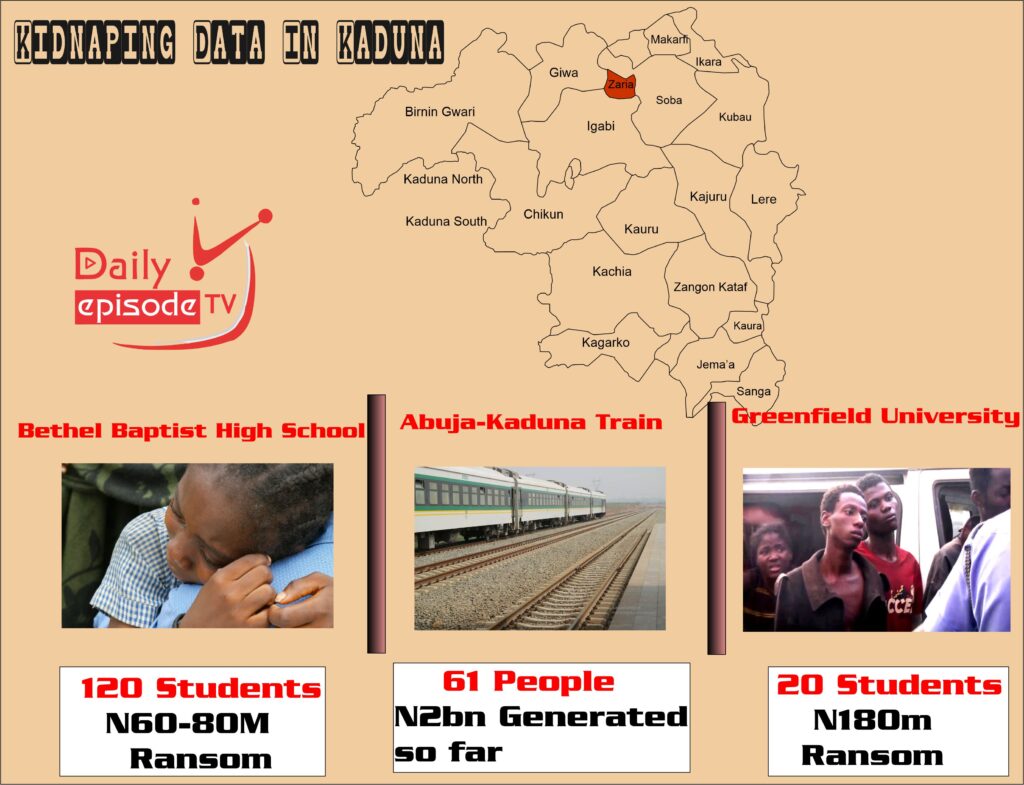
As the Northwest becomes the center for banditry, Kaduna state citizens are more vulnerable to high ransom payments from data gathered by Daily Episode.
Insecurity in the state has grown beyond reasonable lines as terrorists are powerful to unsettle villages and communities amidst the factional terrorist group of Boko-Haram, imposing laws on some communities in the terrorists’ remote area of Birnin-Gwari.
Many citizens, particularly advantaged families in some communities, have budgeted for ransom as part of their expenses and annual expenditure for the state’s increasing mass abductions, with a military base and training command unit of the Nigerian Defence Academy vulnerable to attack and experiencing the tragedy of kidnapping military personnel.
The state can be easily ranked high in ransom payments, with examples of the Greenfield University and Bethel Baptist Schools, where parents and the school management allege to have paid N180m for Greenfield and N60-70m for the Bethel students.
Therefore, in a row, terrorists have generated close to the sum of N3 billion in three deadly attacks and mass abductions that consumed the lives of many citizens in Kaduna state.
The underreported cases of ransom payments may even set records higher than the above list in terms of daily kidnapping in both rural and urban parts of the state; the number of Honda motorcycles purchased as ransom; and the number of payments of thousands and millions to different terrorist groups.
Solutions to Banditry and Escalating Insecurity
Northern Nigeria, which used to be a bastion of security and stability, has fallen into the trap of ethical violence in the absence of historical involvement of traditional institutions, lies, and claims of marginalization rooted in the lingering problems of killings, economic devastation, under-development, and the collapse of education, which is supposed to be a collaborative responsibility of governments, citizens, and traditional institutions, but corruption and government failure play a pretense.
Cohesion, dialogue, and synergy must be developed in true image restoration and future stability of both security, social welfare, economy, and education with empowerment intervention for self-reliance to achieve both national unity and the development of human growth.
Thus, the present counter-banditry operation by the federal government, which is based on military special operations and raids, is admirable and respectable. However, it hasn’t been able to produce the desired glimmer of hope, partly because of the claims of operational difficulties resulting from weapons shortages and other challenges.
Militarily, insecurity may not be the only option, but building synergy and providing the citizens with good and sound education may help in eradicating the lingering insecurity.
Just as Sheik Dr. Ahmed Gumi, a renowned Islamic cleric who served Nigeria as both a military and medical doctor, travels to the terrorist remote areas, calling for their surrender to submit arms and make peace with governments and citizens while empowering the Fulani with books, school construction, medical outreaches, and other social amenities, which are the responsibility of the government.
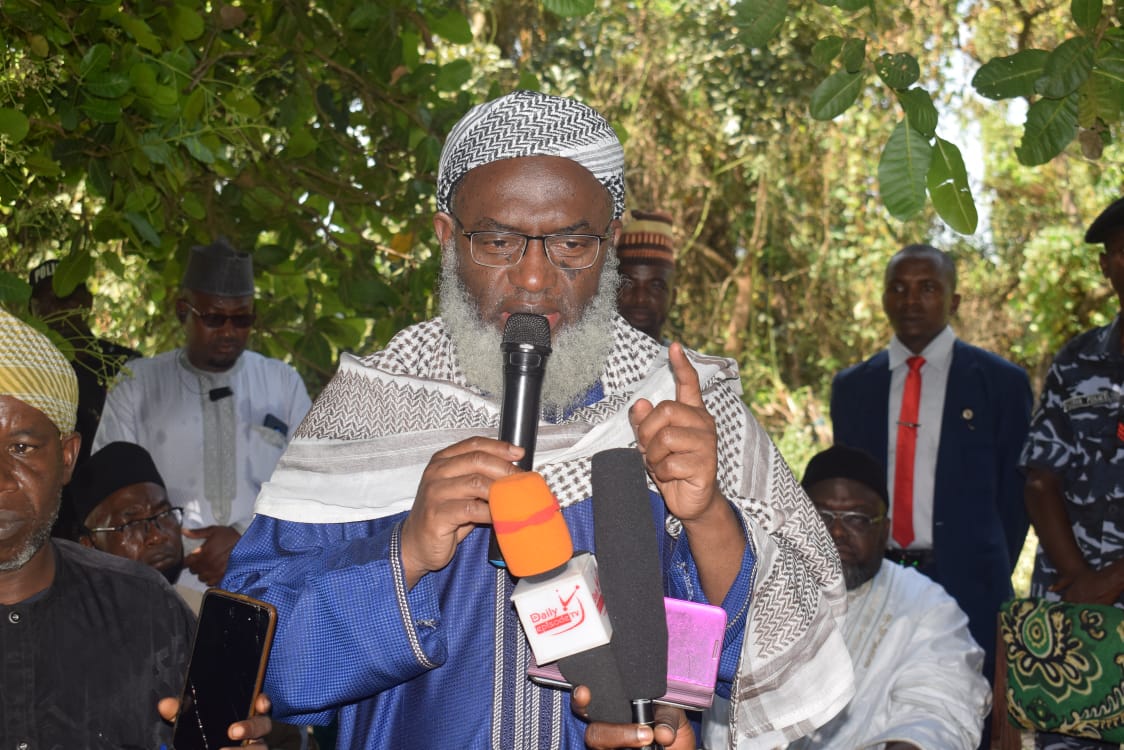
Therefore, It’s a collective drive to which the governments and the traditional institutions must adhere. The motive is to drive literacy and orient the extreme killers who see killings and kidnapping for ransom as a means of retaliation and earning a living.
Although the security apparatus of the state of the country is in a sorry stage. It needs total revival for efficient service to the nations that were once the giants of the African continent.








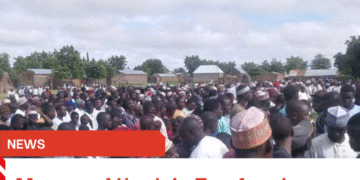
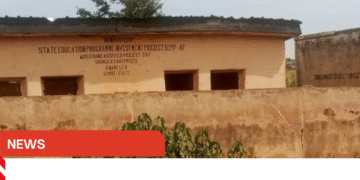


















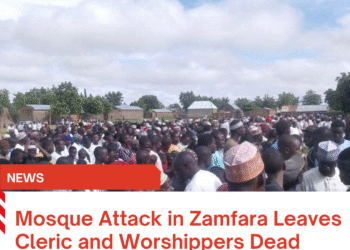
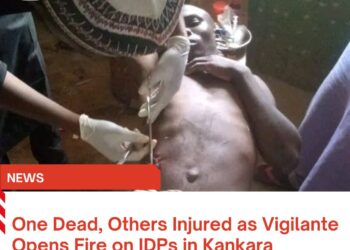





![[BREAKING] APC crisis: Oshiomhole accepts NEC’s decision](https://dailyepisode.ng/wp-content/uploads/2020/06/Adams-Oshiomhole-890x395-1-806x440-1-120x86.jpg)